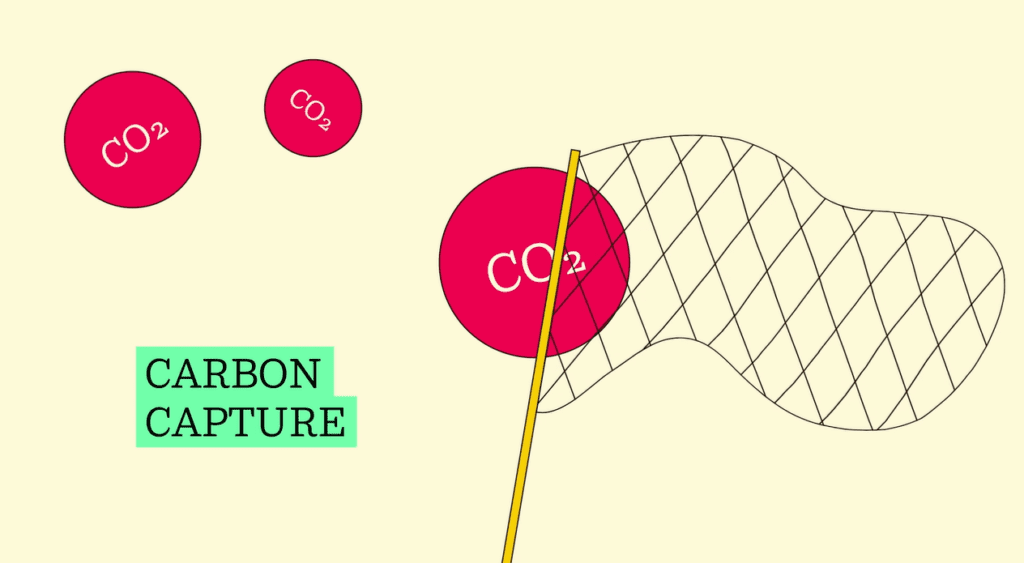This year saw an increase in climate disasters for communities across the country and around the world. And we know that until we really tackle the climate crisis, these disasters will keep getting worse.
We know that fossil fuels are causing the climate crisis. And we know that to avoid more climate destruction, the world must stop digging up and burning fossil fuels. Thankfully, we have all the tools we need. Wind and solar power, paired with energy storage and energy savings, can almost entirely replace fossil fuels – and leave our communities better off.
So what’s standing in the way? Oil and gas companies and their hunger for huge profits. For decades, these companies spent massive amounts of money misleading the public and politicians about climate science. Now, they are pretending they care about climate change and want to do something about it. And one of their favourite tactics is to push technology that they claim can help reduce greenhouse gas emissions – especially carbon capture and storage and hydrogen.
These false solutions won’t do much to reduce emissions, but they will enable oil and gas companies to continue to pump out polluting fossil fuels and earn massive profits.
Watch this video about carbon capture and hydrogen – two false solutions the fossil fuel industry is pushing.
Carbon Capture and Storage
Oil and gas companies like to paint a picture of a future where we can still have oil and gas production, but where oil wells, power plants and oil refineries can capture carbon dioxide, a greenhouse gas, from smokestacks and bury them deep in the ground. This is what is meant by carbon capture and storage (CCS).
Sounds good, but does it work?
Hardly. Carbon Capture is not a new idea – it has been around for more than 50 years. Most projects never make it off the ground. The small number that do vastly underperform.


Up to 90 per cent of emissions from oil and gas come from when these fossil fuels are used, not from when they are produced. So when applied only to the production of oil and gas, carbon capture ignores 90 percent of the problem.
The captured carbon can either be stored underground or used. Unfortunately, most carbon is actually used to dig up even more oil and gas.
Even storing carbon underground comes with risks – and so does transporting the carbon through pipelines. For example, when a carbon dioxide pipeline ruptured in Mississippi in 2020, 300 people were evacuated and 45 people had to be hospitalized.
Fossil fuel companies are pushing carbon capture and storage because it means they can keep producing oil and gas. Carbon capture and storage is expensive, and while these companies are making record profits, they are trying to convince governments to give as much as $50 billion of our tax dollars to build more carbon capture projects and pipelines.
Carbon capture has never worked as promised, the carbon is dangerous to transport and it is extremely expensive, especially compared to the plummeting costs of renewable energy.
The bottom line: the most effective way to deal with emissions of carbon dioxide is to prevent them from ever being created, rather than trying to pluck them haphazardly from the air or smokestacks.
Hydrogen
Hydrogen can be used as a fuel to transport and store energy. Hydrogen doesn’t typically exist by itself in nature and must be produced from compounds that contain it.
To get hydrogen on its own you need to separate it from water, or from natural gas, which is mostly made up of methane gas – a very powerful greenhouse gas. Right now, most of the hydrogen produced is from methane using a highly polluting process that emits lots of greenhouse gasses. So fossil fuel companies have a “solution” to this pollution problem – carbon capture and storage!
Wait…we just explained that carbon capture isn’t actually a solution. So neither is hydrogen produced from fossil fuels. But fossil fuel companies are promoting hydrogen because it’s an excuse to keep producing polluting natural gas.


Importantly, hydrogen should not be used as a delay tactic for uses where existing electrification solutions are available today, like domestic heating or cars and vans, or to delay the phase out of fossil fuels.
There’s no fixing fossil fuels, we need to ditch them
Focusing on carbon capture and hydrogen helps oil and gas companies greenwash themselves, but it won’t help us make the deep emissions cuts we need to tackle the climate crisis.
We know what we need to do: get off of fossil fuels – oil, gas and coal – and do it quickly.
Luckily, we have all the real solutions we need. And as the world moves to embrace these solutions, we will all benefit.
Take Action: Tell Canada to stop Big Oil from polluting our climate








